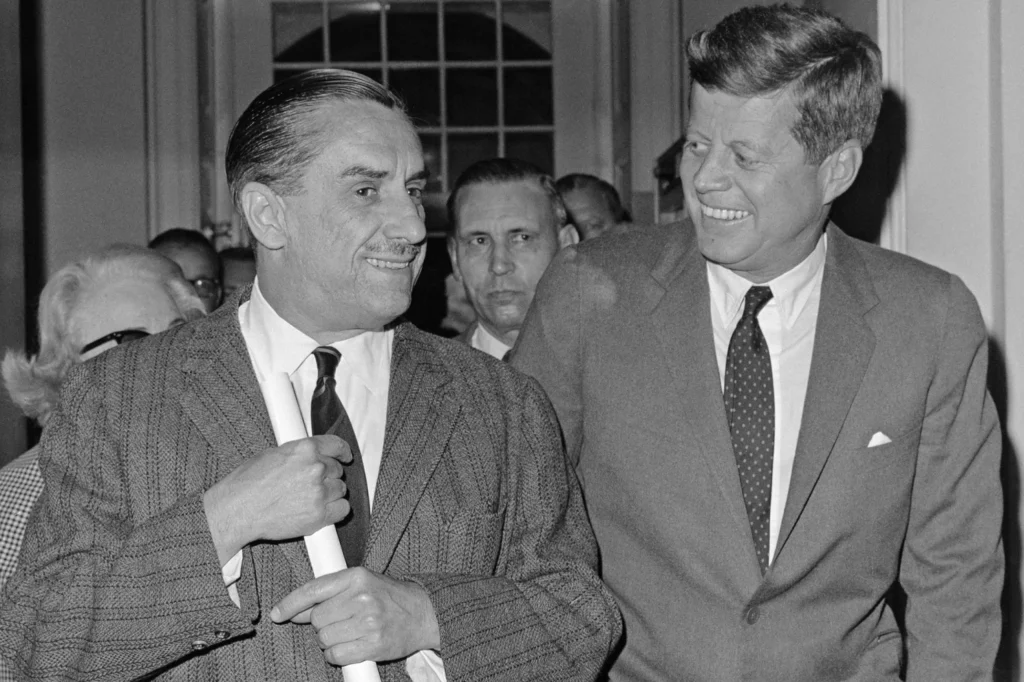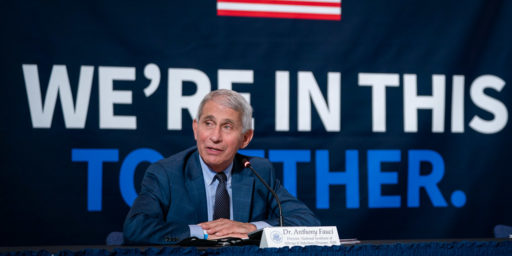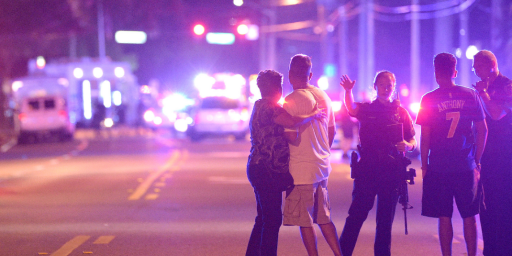Merriman Smith ‘Canceled’ Posthumously
A man most have never heard of is being reassessed more than a half-century after his death.

WaPo (“His reporting on the Kennedy assassination made him a legend. Then a press group looked into his past.”):
Merriman Smith was a distinguished White House correspondent for decades, but he cemented his place in journalism history on a bright afternoon in 1963.
Traveling in the press-pool car as President John F. Kennedy’s motorcade wound through Dallas that day, Smith heard the crackle of gunfire. He reacted instinctively, grabbing the car’s “radiotelephone” before other reporters to file a brief but world-shaking scoop to his editors: “Three shots fired at President Kennedy’s motorcade today in downtown Dallas.”
He went on to report from a hospital where he saw the president slumped in the rear of his limousine, “a dark stain spreading down the right side of [his] dark gray suit.”
Smith’s final dispatch from the day of Kennedy’s assassination was a masterpiece of deadline writing, earning him a Pulitzer Prize in 1964. He went on to win a Presidential Medal of Freedom several years later. And for the past 50 years, the White House Correspondents’ Association has honored print and broadcast reporters with an award that bears his name. Until now.
The WHCA’s board voted unanimously to strip Smith’s name from its signature prize in January after research revealed a more troubling side to the reporter once known to colleagues and presidents as “Smitty.” The vote has not been publicly reported until now.
After a review of its archives and other research, the organization’s board concluded that Smith — who was twice president of the WHCA — upheld restrictions on Black and female journalists, excluding them from membership in the National Press Club, and from attending the correspondents’ annual dinner.
The group has now renamed its Merriman Smith Award as the WHCA Award for Excellence in Presidential News Coverage Under Deadline Pressure.
The decision is a small but symbolic reassessment of a legendary journalist and is in keeping with recent reappraisals of other notable historical figures.
Smith reported on every president from 1941 to early 1970 — from Franklin D. Roosevelt to Richard M. Nixon — for the United Press wire service and its successor, United Press International. As the senior White House reporter in the 1960s, Smith usually ended presidential news conferences by saying, “Thank you. Mr. President.”
[…]
During his leadership of the WHCA, Smith actively opposed admitting female reporters to the organization’s annual White House correspondents’ dinner, according to former Senate historian Donald Ritchie, who recounted Smith’s role in a 2008 speech to the National Press Club. Smith argued that the all-male affairs “were too dirty … and that the men liked it bawdy and they weren’t about to change it,” Ritchie said at the time.
Women were finally admitted in 1962 over Smith’s objection, according to the historian. The late, legendary White House reporter Helen Thomas, among others, had advocated that President Kennedy boycott the dinner if it remained all male, and Kennedy agreed, leading to the change.
Smith also opposed admitting women as members of the National Press Club, despite Kennedy’s advocacy, Ritchie said in his presentation. During a trip aboard Air Force One, he told Kennedy the issue was “dicey” and joked that Kennedy should “stick to things you understand, like the Congo.” (Women first became members of the club in 1971).
Smith also pushed backed in 1955, when the press club on the verge of admitting its first Black journalist, Louis Lautier, according to ”The Eisenhower Years,” a book by Michael S. Mayer. Smith reportedly advised James Hagerty — President Eisenhower’s press secretary and a club member — to “stay out” of the issue. Lautier, a reporter for the Baltimore Afro-American, was ultimately admitted with support from Hagerty and Eisenhower.
As is often the case in these instances, Merriman strikes me as a man of his time. The world of the 1950s and 1960s was simply radically different than it is today on race and gender attitudes. Indeed, I’m old enough to remember when women is certain reporting roles was still quite controversial.
Presumably, Merriman was honored upon his retirement because his contemporaries considered him a legendary journalist who had performed great service to his profession, not because they thought he was a perfect human being or because they agreed with all of his attitudes. At the same time, few journalists today are likely to have any real connection to that career and insinuations that he was racist and sexist are enough to justify disassociating their professional award from him.
This is just another instance that shows the folly of naming pretty much anything after pretty much anyone. Or, at least, the expectation that that naming will be permanent. Over time, even heroes like George Washington, Thomas Jefferson, or Abraham Lincoln fall out of favor because their sensibilities were so different than ours.
We’re in the process of renaming many military bases around the country that memorialize generals and others associated with the Confederacy, slavery, or otherwise problematic from the standpoint of the 21st Century. And I’m in favor of it. Most people have only the faintest idea who Henry Benning, Braxton Bragg, or John Bell Hood were; honoring them while potentially insulting the Black soldiers stationed there has no upside. Bring on Fort Colin Powell and Fort Alwyn Cashe. Then again, Powell’s “yellowcake” speech likely disqualifies him. Maybe the Army should just emulate the Marines and name bases after local cities and landmarks. I suspect “29 Palms” will never offend anyone. Or, at least, not too many.






Except the very article you quote demonstrates there was significant opposition to his positions at the time, and indeed, he frequently lost these battles, suggesting he was, even in the 60s, the minority position.
Stop trying to soft soap racism and misogyny with the tired “of the times” cop out.
Excluding women from the dinner because the guys wanted to tell dirty jokes sounds pretty…juvenile. doesn’t it? Not behavior in the least bit befitting a serious adult journalist who wanted to cover, ahem, important topics.
@Stormy Dragon: Sigh. That there was opposition to his views, even at the highest levels, doesn’t mean they weren’t decidedly mainstream.
@CSK: Sure. But journalism had been a man’s world and, for most of his time, not an elite enterprise. Journalists of the 1940s, 1950s, and even much of the 1960s were blue collar types, often without college degrees. Hell, it took court orders to force white collar organizations such as the Kiwanis to gender integrate in the late 1980s.
Agreed about the general principle of naming things.
The main thing that strikes me about this story is the reminder of how recently women were thoroughly excluded from a host of professional opportunities and how this is still a relevant issue in trying to ascertain the relative power of women in the current era. (Which echos other conversations about the long-term effects of systematic racism).
The 70s simply weren’t that long ago in the grand scheme of things.
I’m in basic agreement with you, James. In my work developing medical devices I tell project teams evaluating risk that, “once you know, you know” and however disconcerting it is that reality has overturned your amazingly well thought out risk assessment, a single real world fact trumps it all and you have to start over again. Similarly, once we know that someone in the past had opinions that are out of bounds today, well, we know. And given google, if you keep the name, the transgressions of who the award or the base is named for will come to dominate discussion. In this specific case it detracts from the award itself, and interferes with its purpose to recognize exceptional journalism.
@James Joyner:
Oh, I know. I was commenting on the puerility of someone saying that women should be kept from participating in the dinner because the boys “liked it bawdy.” What an asinine justification.
@Steven L. Taylor: @MarkedMan: @CSK: It’s really remarkable how much has changed on the gender front in my adult lifetime. The casual misogyny of the 1970s and 1980s–in everything from popular music and movies to the business, sports, and media worlds— is shocking when viewed from today’s perspective.
@James Joyner:
Indeed. Back in the mid-eighties, the chair of my department–granted, he was an imbecile–informed the girls that he had to pay the boys more or else they’d feel bad.
I am not joking.
@CSK:
Are you agreeing with James that this is a sign of the times and should be dismissed as such?
I’ve never approved of the idea of enshrining anyone as a hero. We are all shades of gray, none of us is pure. Admire the accomplishment, don’t put the individual on a pedestal. This is a recurring theme in questionnaires I have to fill out: Who are your heroes? I have to give some long, tedious answer explaining that I don’t really do hero-worship. (BTW I practice what I preach when people try to prop Katherine or me on a pedestal.) The work is the work and speaks for itself. The human behind the work is human, ’nuff said.
One of the things I so despise about cancel culture is its superficial, sophomoric understanding of the world. If we find out Van Gogh was a pedophile, do we have to burn his paintings? How would that make life better? Conversely, if it turns out Larry the Cable Guy is a great humanitarian, can I still not think he’s funny? Shall we dispense with all the science, math, art, literature, music and architecture not generated by saints?
Human and product are not the same thing. Smith’s reporting was evidently pretty good. He was apparently a sexist, which affects the quality of his work not at all. Maybe we’d just better number buildings, ships, roads, bridges etc… Because literally anyone whose name is ever used could turn out to be unworthy.
From now on the pastry known as a Napoleon should be designated Pastry #6.
@James Joyner: I’m afraid the world hasn’t changed as much as we would hope, especially in sports. I don’t know how much you followed the Washington Post investigation into Dan Snyder and his WFT management but that workplace is one seriously toxic and transgressive environment. And the NFL reaction to their own “investigation” was essentially to help Snyder cover up his arguably criminal behavior (for example, demanding that underlings bring him photos of cheerleaders getting dressed and then sharing them widely with his NFL bros). The message the NFL sent with their few meaningless sanctions was, “Hey boys! Party on! We got your back!”
@Michael Reynolds:
You gotta admit that whatever we conclude about the “have to” part, finding out that Van Gogh was a pedophile would change how many, many of us have view his work. For me, some outrages rise to the point where it breaks mimesis and I can no longer enjoy someone’s work. Woody Allen comes to mind. Used to be a big fan and haven’t watched any of his stuff for decades. Heck, the behavior doesn’t even have to be offensive. I have a lot of trouble watching a Tom Cruise movie now because every 15 minutes or so I find myself thinking, “this clown legit believes in Scientology to the point where he thinks he’s the Scientology Jesus!”. It’s one of the reasons I don’t read celebrity gossip or watch celebrity interviews. I just don’t want to know.
@Stormy Dragon:
So, historical context is irrelevant? Really? So John Brown was a terrorist? No better than Osama Bin Laden?
Like I said above: sophomoric.
If you ask me, presenting people as pawns of their own time is actually more of a disservice to them than taking their names off an award. Cancel culture makes everyone out to be an oppressor. Defenders of the cancelled are even worse in their monotony. Just because you fought to keep your dumb club all-white doesn’t mean at the end of the day you believed you were right. The man who was supposedly confident in his actions? Turns out he was in despair the entire time, and all he could do was stay one step ahead of clarity. Wow, what a shock.
@MarkedMan:
Tom Cruise is nuts. He’s also a very gifted actor. I watch his movies and think, ‘Dude’s nuts, but he does commit to the role.’
The wise approach, IMO, is to drop the binaries and take a phenomenological view, trying to see clearly what is, without filters or categorization. Many, maybe even most humans are pigs, if given the opportunity. People of accomplishment are given the opportunity and many of them are indeed, pigs. They are neither more or less pigs on average than the people judging them. Cancel culture is hypocrites passing judgment on people they know little or nothing about, who lived in circumstances they know little or nothing about.
Matthew 7:1-5:
@MarkedMan:
I think the distinction between art and artist only works with high culture. Louis-Ferdinand Celine wrote 3 great novels about how he and his wife and the rest of the Vichy collaborators survived in Germany after the Allies liberated France. He didn’t write a schlocky book about how he was in the Resistance being a hero. Same goes with someone like Roman Polanski. You can’t watch Bitter Moon or Cul de Sac and be surprised at what Polanski did.
@PJS:
I think it was an attitude typical of the times. And I heartily disapprove of it, if that’s what you mean. I would hardly dismiss it, having experienced it myself in real life.
@Michael Reynolds
Etymological trivia: the pastry was originally called a Neopolitan pastry because it originated in Naples, Italy and was only later corrupted into a “Napoleon”, so we could just go back to calling it a Neopolitan pastry
@Stormy Dragon:
Neapolitan means from Naples. I don’t think the French would be happy with that. Naples has pizza, the Frogs have patisserie.
No congress can tie the hands of a future congress and no past generation can dictate who we honor. Pendulums swing. The woke and #metoo pendulums have swung too far, but look where they started. They’ll settle out.
@Michael Reynolds:
Counterpoint: Should Nixon have pardoned William Calley because racism toward the Vietnamese was mainstream at the time and we can’t really expect him to not be a “man of his times”? Acquit all the Nuremberg defendants because Nazism was mainstream and we can’t really expect them not to be “men of their times”?
Is there any line where we can go “no, this was wrong no matter how popular it was a the time”? Or is anyone who’s not a complete moral nihilist a “sophmoric woke SJW” now?
This isn’t a case of Merriam Smith saying some things that haven’t aged well but that ultimately didn’t hurt anyone. He saw change was coming and intentionally chose to be one of the people actively fighting against that change. He deliberately chose to hurt other people for his own convenience.
@CSK:
Indeed! It’s almost as if none of them had ever heard of Dorothy Parker.
@Just nutha ignint cracker:
Ah, yes. But according to one of her biographers (male) Parker was a tiny little sad-eyed woman “who had the mind of a man,” presumably because she was witty. Women aren’t witty.
Bullshit.
Who?
We can avoid the angst behind these re-namings if we renamed things every generation or so. WTF should we have things named after the personalities of 19th and early 20th Centuries? This country has produced a wealth of heros and heroines in the Military, Arts, Academia, Sports, Humanities, Medicine since those times.
Lets honor more of our modern heros and leave the past, and its flaws, in museums and history books.
@Jim Brown 32:
I have heard–and I suspect this is true–that the various forts were named after Confederate general as a sop to the feelings of the South after they’d been so decisively clobbered by the Yankees. It seems to have been motivated by a sort of “Oh, hell, let’s fling them that bone and maybe they’ll stop whining about the War of Northern Aggression.”
@CSK:
Fort Benning and Fort Bragg weren’t established until WW1 and Fort Hood wasn’t established until WW2. Like most things named for Confederates, these weren’t things done in the aftermath of the Civil War, but acts taken decades later during Jim Crow that were fully intended as insults toward minorities from their inception.
Which came first, Mark McGwire stating “I did not come here to talk about the past”?
Or the Missouri Legislature renaming the Mark McGwire Highway to the Mark Twain Highway?
More importantly, who actually gave a damn other than die hard Stinkbird fans?
@Stormy Dragon:
Not in the immediate aftermath, no. But I had no idea until fairly recent years just how profoundly some in the South still hate us Yanks for depriving their forbears of the right to enslave other human beings.
While I appreciate the pandering to the loyal readers and commenters — this seems tailor made for Michael Reynolds — I have to ask: why is canceled in quotes in the headline?
Surely there is some agreed upon definition that would remove the need for such scare quotes.
@Gustopher: While I think, contrary to the views of many, that ‘cancel culture’ exists, people use the term imprecisely to mean a whole range of only vaguely related things. And, for that matter, I’m not sure that a dead person can even be canceled or that removing a name from a single award would qualify.
@CSK: I am aware of a situation wherein a chair was purposefully paying the males more than the females in the late 90s (after all, they were the heads of households).
@Steven L. Taylor:
Yes, I’ve heard that before: The men have wives and children, so they have to be paid more.
@Stormy Dragon:
The Calley example isn’t great. He violated the UCMJ, any charges would be based on that.
But I’m happy to see that you’ve discovered moral ambiguity. Here’s an easy one: a Roman in the fifth century BC owned slaves. An American in 1860 owned slaves. Are they equally culpable? Should we no longer have the months of July and August given that they honor two massive slaveholders?
Here’s another one: American Indians frequently used torture. So did Catholics. So did the Japanese. Same same?
If you believe in a fixed moral universe where things are absolutely right or absolutely wrong regardless of time, knowledge base, etc… I’d think you’d be happy as we have clearly moved away from slavery and torture. Hooray for our enlightened times!
Personally I see a sliding scale. So, no, the Roman is not equally culpable as the Alabama plantation owner. No one had ever even suggested to the Roman that there was an issue with slavery. The Plantation owner is more culpable because he’d had opportunity to look at his own behavior in light of contemporary critiques.
If you’re looking for hard and fast lines, I think that’s a fool’s errand. For most of human history it was immoral to question the official religion. A great many people died because of that immoral behavior. So was the skeptic a thousand years ago moral or immoral? The person who tortured a heretic was behaving morally, trying to save the heretic’s soul. Both imagined themselves to be right. You and I would back the heretic, but that is very much a minority opinion in history. And are you 100% sure you’re right? What if it turns out there really is a vengeful God?
It just isn’t as easy as black and white in perpetuity. That’s a fundamentalist point of view. Right and wrong evolve, which I see as a plus, because it suggests that we may find ways in the future to expand on what behaviors we find immoral.
@Michael Reynolds:
The fact that he can convincingly play someone who isn’t batshit insane really does mean he is a very good actor.
For me the twin prongs are:
– am I financially contributing to someone who continues to harm others?
– does knowledge of this person affect my ability to enjoy the art?
If Keneau Reeves thought he was Scientology Jesus, it would change The Matrix from a trans allegory that ripped off Grant Morrison’s The Invisibles to something else entirely. (Just as the knowledge that the Wachowskis are trans and think of their creation as a trans allegory changed how the movie is viewed away from previous interpretations)
But Tom Cruise? His works are so very standard that he doesn’t really bring anything from his Scientology Cult into them.
(And I assume Roman Polanski is continuing to drug and rape 13 year old girls… and Woody Allen is so fucking weird that the accusations of abusing children will stick with or without evidence and color everything he does)
On the other hand… Kevin Stacey’s role in Baby Driver only makes sense when you assume the character has been preying upon much younger men for decades just like the actor.
@Michael Reynolds:
People of accomplishment can be much more effective pigs, and can surround themselves with others who will support their boorish behavior.
If we’re quoting Bible verses there’s something about needling camels in the eye or whatever.
If this dude was a sexist ass, they should have renamed the award after Walter Cronkite after he died, or just wait for Dan Rather to die unless I missed something about him.
(Also, we should have an annual Richard Byrd Award for the greatest efforts at building equality by a former member of the Klan.)
@MarkedMan:
Exactly. Bill Cosby’s standup is objectively funny, but I simply cannot consume his work any longer. Do I think it all should be burned? No, but if I never saw it again that would be fine with me.
I’m basically with Michael on this but I also agree with Steven about Bill Cosby.
Secondly, if one believes that historic figures who were sexist by today’s standard ought not to have monuments or things named after them, then you’d have to “cancel” almost every American President and historical figure.
And I think we ought to keep in mind that America is exceptional in our long struggle for women’s equality. With the exception of a few European countries, most everywhere else on earth is still in the 1950s or even the 1300s when it comes to gender discrimination and cultural gender roles.
@Steven L. Taylor: @MarkedMan:
I’ve been interested to see how comedians deal with Cosby. A great many of them grew up on Cosby, were inspired to go into comedy by Cosby. Occasionally I see comedians discussing in interviews whether they are able to still appreciate the humor, after all, these are the professionals who should be best able to judge dispassionately. My entirely unscientific take-away is that opinion is split and ambivalent.
For me, I can still appreciate the joke even when it comes from an asshole. But I start from a different position than many because I don’t do hero worship, or assign the hero role to any but the most exceptional people. IOW I did not begin by conflating man and material, so there’s less to disentangle. To me Cosby, like most comedians, is a great writer, and the words still work.
There can be no “cancel culture” as long as we avoid burning our libraries. A real, thorough “damnatio memoriae” would require it. But until we do start burning libraries, “cancel culture” is just one more example in a long line of right-wing culture wars straw men.
I admit that this view assumes a society with a high degree of literacy.